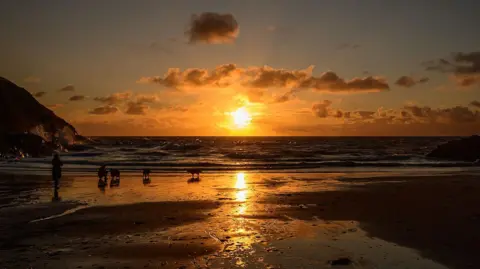'More work needed' to meet climate change targets
 Manx Scenes
Manx ScenesThe Manx government has made "important progress" on its climate change action plan but "more is needed" for the island to meet its targets, the environment minister has said.
Clare Barber provided an update to Tynwald about how the government was trying to meet its objectives on how best to respond to issues associated with climate change.
She outlined the findings of this year's annual report - published in June - that was produced in accordance with the 2021 Climate Change Act.
Barber said: "Important progress has been made but I acknowledge that more is needed to realise and maximise the co-benefits and savings of climate action for our island."
She acknowledged that other political priorities had taken precedence in 2024, which had been "a challenging year for taking climate action".
Despite this, Barber outlined a number of areas in which she said progress had been made.
She said residents were being supported to make their homes more energy efficient, and that further help would be offered later this year.
The minister added that, as of the start of this year, fossil fuel boilers could no longer be installed in new buildings.
She also said emissions and sustainability audits were being carried out for the airport and the TT festival.
Barber added that work on a land management framework had continued during the last year.
'Absolutely committed'
In a lengthy debate, Douglas Central MHK Chris Thomas praised the report's "honesty" but asked what the consequences would be "for being so far behind".
Peel and Glenfaba member Kate Lord-Brennan said the targets were "just not achievable" and it was "time to re-evaluate" them.
And Arbory, Castletown and Malew MHK Tim Glover read out a long list of items in the report that had either not been started, put on hold or had missed deadlines.
Among them was banning the registration of new petrol and diesel cars on the island from 2030 and hybrid vehicles from 2035.
These plans have been put on hold.
The aim of the government's energy strategy to supply 100% of the island's electricity from carbon neutral sources by 2030 was labelled "at risk".
Tynwald also heard that plans to deliver a strategy to take account of climate impacts - across all areas of society, economy and the natural environment - had not yet been started.
These were among more than 26 examples outlined by Glover, which he said demonstrated "how far behind we are with actually meeting our obligations".
'Falling emissions'
Not all parliamentary feedback was negative, however.
Member of the Legislative Council Paul Craine described the government's overall plan as "very ambitious" and said "we should be celebrating that so many of these areas we [have] moved on".
He said: "Emissions are down by 3.8%. Without our actions I'm sure they would've risen."
In closing, Barber said it was important to "take the time to get decisions like this right" and, as a result, the government "may struggle with our time frames".
She said there would be an update on the island's energy strategy towards the end of the year.
The minister said this "significant piece of the jigsaw" would be debated in Tynwald.
"The work is absolutely ongoing, the team are absolutely committed, and the co-benefits of action are absolutely clear," she added.
Tynwald voted to receive the report, with only three votes against do so in the House of Keys.
Read more stories from the Isle of Man on the BBC, watch BBC North West Tonight on BBC iPlayer and follow BBC Isle of Man on Facebook and X.
